Foul Deeds Will Rise Read online
Page 13
“So, Doctor,” Kirk asked, “what is your professional opinion?”
“Based on a general examination and brief consultation, she seems sane enough to me, albeit under severe stress and a bit prone to melodrama.” McCoy sat down behind his desk and called up a file on his computer terminal. Kirk caught a glimpse of a photo of a somewhat younger Lenore wearing a brown coverall. “She allowed me to access her confidential medical files, which I’ve had a chance to review. She was indeed institutionalized at the Federation mental treatment center on Gilead Three for fifteen years, and she spent another year under probation at a colony for recovered criminal offenders before being released on her own recognizance.”
Kirk nodded. This was what he had already verified in broad strokes. He wanted a fuller picture now. “Why was she released?”
“After many years, she responded positively to an aggressive regimen of therapy, counseling, Vulcan meditation techniques, and medication. In particular, she benefited greatly from regular doses of zetaproprion.”
It took Kirk a minute to recognize the name. “That’s the same drug that cured Captain Garth, isn’t it?”
Garth of Izar was a legendary starship fleet captain who went insane after suffering a serious injury, exacerbated by some well-meaning Antosians who endowed him with the ability to alter his body’s cellular structure. Confined to a rehab colony on Elba II, Garth had been a dangerous lunatic until the Enterprise succeeded in delivering the then-revolutionary new drug to the asylum. Kirk had personally witnessed the zetaproprion’s dramatic effect on Garth, restoring his sanity after years of madness. He wasn’t surprised to hear that it had helped Lenore as well.
“Bingo,” McCoy said, “although the effect wasn’t quite as immediate in Lenore’s case, given their very different pathologies. Garth’s issues were primarily organic—brain damage complicated by that damn ‘cellular metamorphosis’ trick the Antosians taught him—so it was just a matter of correcting his brain chemistry. But Lenore’s psychological scars went much deeper and needed more than just a quick biochemical fix. The zetaproprion couldn’t undo her troubled past, or relieve her guilt over killing her father and all those others, but it could help dispel her delusions so that she could remember that past and begin to come to terms with it. Once she was able to face reality, with the help of the drug, therapeutic breakthroughs became possible and she could finally make real progress.”
Kirk remembered Lenore mentioning that it had taken years of treatment before she could acknowledge what she had done. Apparently the zetaproprion had played a big part in that.
“I see. And do you agree with her doctors’ ruling that she no longer poses a threat?”
“Hard to say,” McCoy said. “Psychiatry is not an exact science, even today. She’s still taking regular doses of zetaproprion for maintenance, which seems to be doing the trick. Then again, we all missed her pathology the last time around . . . and she is quite the actress. For all we know, her ‘sanity’ is just another brilliant performance.”
Along with her claims of innocence, Kirk thought. “No offense, Bones, but I would’ve preferred a more conclusive diagnosis.”
“I’m not a mind reader, Jim. That’s Spock’s department. And before you ask . . . no, I can’t in good conscience sanction a Vulcan mind-meld in this instance. Her psyche is far too fragile for that kind of invasion, even if she consented to it willingly. You know how intense a meld is. We both do. Given her history of mental instability, it would be criminally irresponsible to subject her to that.”
Kirk knew where McCoy was coming from. They’d both been on the receiving end of mind-melds on occasion, so Kirk knew Bones wasn’t exaggerating when he stressed just how unsettling it could be to let another person go rooting around in your mind. It was a troubling experience at the best of times, let alone for someone like Lenore who had spent years struggling to regain her mental equilibrium. A mind-meld could very well undo her hard-won sanity.
“Point taken,” he said. “And I suppose the same applies to using a psychotricorder to probe her memory of the last twenty-four hours? Or even monitoring her brain waves to see if she’s telling the truth?”
“More or less,” McCoy said. “Those are not quite as invasive, but, given her history, the results would be inconclusive anyway. Her thought processes and psychology are already suspect. She might not react the same way a fully sane person would.”
So much for that idea, Kirk thought. He had already decided to ask the Oyolu to submit to computerized lie-detector tests and had hoped to do the same with Lenore, but apparently it was more complicated than that.
“Let me ask you something, Bones. Could she have conceivably committed the murder without retaining any memory of it?”
“I can’t rule out that possibility,” McCoy said. “Her records do indicate a past history of disassociation and denial. As we’ve discussed, it was years before she could even accept that her father was dead, let alone that she had killed him.”
“While trying to kill me,” Kirk said. “How do we know she’s not repressing the memory of having killed General Tem as well?”
“We don’t, not one hundred percent. But her previous issues were years ago, before she responded to treatment. In theory, the zetaproprion helps her keep her grip on reality and holds any delusions at bay.”
That’s not always a blessing, Kirk thought. Personally, I’m dealing with rather too much reality right now.
“Understood, Doctor. You’ve given me a lot to think about.”
“Sorry about that,” McCoy drawled. “Comes with the job, I’m afraid.”
“Yours or mine?”
McCoy shrugged. “Take your pick.”
“Moving on to other matters,” Kirk said, “I’d still like to run lie-detector tests on A’Barra and Ifusi, so I’m going to need your assistance getting that set up, hopefully in the next day or so. I assume we’re going to have to recalibrate the program to accommodate Oyolu physiology? Their basic metabolism and characteristics?”
“Just give me a chance to do a little homework,” McCoy said. “But even if the Oyolu come through with flying colors, will the Pavakians accept the results as decisive? Or will they claim that the tests were rigged or that the evidence is inadmissible according to their laws?”
“All very good questions,” Kirk conceded. Different planets had different legal systems and ideas about what constituted proof of guilt or innocence. And the Pavakians had every reason to reject any test that cleared the Oyolu of wrongdoing. “I just wish I had more answers than questions.”
McCoy sighed. “Don’t we all?”
• • •
“You found something?” Chekov asked.
Lieutenant Banks had summoned him to the forward end of Q Deck, where the secondary hull’s emergency transporters were located. She was standing before the transporter control console, examining various readouts with a look of great concentration, when he arrived on the scene. To his relief, he felt no desire to sneeze. The doctor’s antihistamine appeared to be working.
“Possibly,” she reported. “I was following your advice and reviewing the ship’s computer records in and around the time of the murder and I found something peculiar. According to the logs, one of these emergency transporters was activated approximately fifteen minutes before the murder took place.”
“But there was no emergency that night,” Chekov said. “At least not until the weapon alarm went off.”
“Exactly,” Banks said. “That’s what seemed so puzzling. Granted, this might not have anything to do with the assassination, but . . .”
“No,” Chekov said. “I think we are onto something.”
But what? he wondered.
The emergency transporter facility was one of two such units positioned on either side of the central intermix chamber in Engineering. They were intended as a means of quickly evacuatin
g personnel from the secondary hull in the event of a disaster. In theory, endangered crew members could be beamed to the primary transporter facility in the saucer section or, if possible, to a nearby vessel, planet, or space station. They were a safety precaution, to be employed only in dire circumstances. He could think of no reason why they would have been used last night.
No legitimate reason, that was.
“Could the assassin have beamed aboard right before the killing?”
“Unlikely,” she replied. “I checked the proximity scanners and there was no vessel within transporter range at that time. And a cloaked vessel would not have been able to activate their transporters without being detected.”
Chekov had to agree. One of these days somebody was going to invent a cloaking device that allowed a ship to activate its weapons or transporters while cloaked, but, thankfully, that day had yet to arrive. Unless they were dealing with an enemy possessed of some radical new technology.
He nodded at the control panel. “What do the transporter records say?”
“Nothing,” she said glumly. “The data has been completely scrubbed from the terminal and the pattern buffer is empty as well.” She stepped away from the console. “A thorough forensic analysis of the hardware might turn up something, but that’s going to take a while. In the meantime, there’s no way of knowing who used the transporter or why.”
Chekov nodded. “And I take it there’s no authorized usage on record?”
“I’m afraid not. This was not ordered by anyone in charge.” She stepped away from the controls. “Maybe the killer used the transporter to beam directly into General Tem’s quarters, bypassing the locked door?”
“A very risky strategy,” Chekov said. Intraship beaming was a highly hazardous feat to be avoided except in the most extreme emergencies. The odds of accidentally beaming into a bulkhead or some other solid object, with fatal results, were considerable. “It hardly seems worth the danger to life and limb just to get past a lock.”
“Unless we’re looking for a fanatic . . . or a lunatic.”
Chekov thought of “Lyla Kassidy,” a.k.a. Lenore Karidian. He had not been aboard the old Enterprise when the visiting actress had been exposed as a deranged murderer, but Captain Kirk had discreetly alerted him to the suspect’s history. Kassidy/Karidian had once been diagnosed as criminally insane; she was allegedly saner these days, but maybe she was still crazy enough to beam herself into the general’s quarters? Then again, Tem had been the Scourge of Azoza after all. Who knew how far the Oyolu would go to avenge the many victims of his infamous blockade?
He peered at the empty transporter pads. It was all too easy to imagine any one of their suspects there. Armed with the disruptor they used to vaporize General Tem.
“What are you thinking, sir?” Banks asked.
“I am thinking that you may have uncovered a significant clue. Excellent work, Lieutenant.”
“Thank you, sir, but what does it mean?”
Chekov wished he knew.
Fourteen
“So there’s no way to tell who used the emergency transporter right before the murder?”
“Apparently not, Captain,” Chekov reported. “Lieutenant Banks is going through the console’s circuits with a fine-tooth comb, but I cannot promise that they will cough up anything anytime soon . . . or ever.”
“Understood,” Kirk said. “Thank you for keeping me informed.”
Another day had passed since General Tem’s assassination, and the killer’s identity remained a mystery. Kirk and Riley had reconvened in the briefing room in hopes of possibly clearing the Oyolu’s names at least. McCoy was also on hand to help administer the lie-detector test. A witness seat equipped with a biological sensor mechanism had been installed at one end of the table, while the computer had been programmed to monitor the Oyolu’s brain waves and physiological responses in order to tell whether they were lying or not. The program was not one hundred percent accurate, especially where different varieties of humanoids were concerned, but it might help them rule out A’Barra and Ifusi as suspects.
That would be good news for the peace talks, Kirk reflected, but look bad for Lenore.
Granted, there was always the possibility that the Pavakians would reject the findings of the test, but at least the results might point the investigation in the right direction. At this point, Kirk was willing to try most anything to cut through the fog surrounding the general’s murder.
“We ready to go?” Kirk asked McCoy.
“As ready as we’re going to be,” McCoy answered. “I’m going to want to take some baseline readings of the Oyolu when they get here, but we might as well get the show on the road.”
“Very well.” Kirk leaned forward to activate the comm unit on the table in front of him. “Kirk to Uhura. Please have the Oyolu report to—”
Before he could finish, Uhura interrupted him.
“Captain! I’m getting reports of a disturbance on D Deck. There’s trouble among the delegates.”
Kirk and Riley exchanged worried looks. Now what?
“On my way. Kirk out!”
The briefing room was abandoned as all present rushed to the corridor outside A’Barra’s VIP suite, where they found a furious Ifusi being restrained by a couple of struggling security officers, including the bodyguard Kirk had assigned to Colonel Gast.
“Monster! Demon!” the young Oyolu bellowed as he strained to get at Gast, who backed away cautiously, looking understandably shaken. Spittle sprayed from Ifusi’s lips as he glared furiously at his Pavakian counterpart. His head was hunched beneath his shoulders, as though he was intent on goring Gast with his horns. His hooves pawed at the floor. “You will pay for this, Pavakian! Your entire vile species will pay!”
“Hold on here!” Kirk said, taking charge. “What’s this all about?”
“I have no idea, Captain.” Gast put more distance between herself and Ifusi. “Except that this barbarian has obviously lost his mind.”
“You are the barbarians!” Ifusi shot back. “Perfidious and cruel and completely without mercy!”
“That’s enough, both of you!” Kirk waded in between them. “Somebody tell me what started this.”
“See for yourself!” Ifusi said, snorting derisively. Unable to break from the guards’ grip, he stopped straining and twisting long enough to turn his horns toward the door to A’Barra’s guest quarters. “Let your own eyes look upon a great wrong.”
A sinking feeling came over Kirk as he realized that A’Barra was nowhere to be seen. Even Lenore had been drawn from her own quarters by the commotion; he spotted her standing off to one side, anxiously watching this latest imbroglio. But the senior Oyolu had yet to make an appearance, despite the noisy, undiplomatic confrontation taking place right outside his door.
This didn’t look good.
“Chekov, you’re with me.” Kirk secured a phaser and headed for the door. “Everybody else, stay where you are.” Riley moved to join them, but Kirk shook his head. “That means you too, Ambassador.”
Riley started to protest. “But the minister—”
“You’ll be the first to know,” Kirk promised. He addressed the security officers. “Keep everyone out. Am I understood?”
“Aye, sir,” Lieutenant Xadd responded. The burly Zeosian had the build of a barroom bouncer. A stony expression made it clear that nobody would be getting past, including Riley and the feuding delegates. His webbed feet were planted firmly on the floor. “Crystal clear.”
McCoy knew better than to try to push past Xadd. “Jim?”
“If I need a doctor, I know where to find you.”
Kirk and Chekov approached the door, which slid open before them. Entering cautiously, phasers drawn, they were quickly confronted by what Kirk had feared: A’Barra’s body sprawled upon the floor. Glassy eyes stared lifelessly at the ceiling. H
is face was contorted in a frozen rictus. Dried saliva and bile caked his lips. Kirk didn’t need McCoy to tell him that the man was dead.
Unlike General Tem, however, he appeared to be in one piece.
“Damn it,” Kirk swore.
Chekov finished clearing the suite. He lowered his phaser. “No one else here, Captain,” he reported. “We should be careful to avoid contaminating the crime scene.”
“My thoughts exactly, Commander.”
He didn’t question Chekov’s describing the suite as a crime scene. It was possible, Kirk supposed, that A’Barra had died of natural causes, but he didn’t believe that for a second. They clearly had another assassination on their hands, even if the cause of death wasn’t immediately apparent. Kirk peered down at the body, but he did not spy any weapons burns or obvious wounds. He guessed that Ifusi had discovered the corpse when he’d reported to A’Barra this morning.
Unless, of course, Ifusi was the killer.
“Let Doctor McCoy in,” Kirk instructed, “but no one else.”
There was no hope of keeping A’Barra’s death secret, of course, but Kirk wanted to keep the number of people traipsing through the crime scene to a minimum. The killer had left an entire body behind this time. Kirk could only hope the assassin had also left them a clue to his or her identity.
“Yes, sir.” Chekov’s nose wrinkled, as though he was holding back another sneeze. “Excuse me just a moment, Captain.” He fished the pill vial from his pocket and popped a tablet into his mouth. Chekov sighed in relief as the medication quickly took effect. “Ah, much better. I will be right back with Doctor McCoy, sir.”
True to his word, Chekov returned moments later with McCoy, who gasped at the sight of A’Barra’s body.
“Good God,” the doctor said softly. “Not again.”
“Looks like it,” Kirk responded. “I need you to tell me what killed him, as quickly as you can. A tense situation is about to go critical, if it hasn’t already, and I need answers, pronto.” There wasn’t even time to mourn the man’s passing and regret the tragic loss of life. “Anything you can tell me about how he died might help me keep a full-scale war from breaking out.”

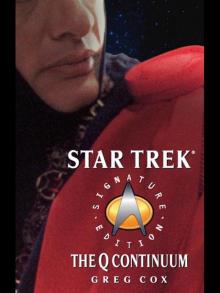 Q-Space
Q-Space Godzilla - the Official Movie Novelization
Godzilla - the Official Movie Novelization War for the Planet of the Apes: Official Movie Novelization
War for the Planet of the Apes: Official Movie Novelization Underworld: Evolution
Underworld: Evolution Underworld
Underworld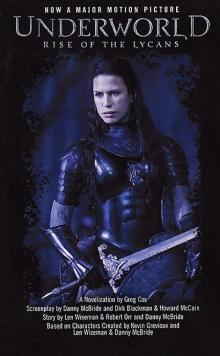 Rise of the Lycans
Rise of the Lycans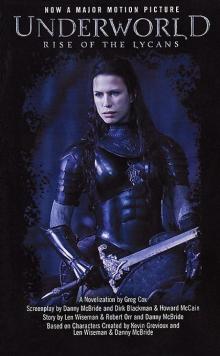 04 - Rise of the Lycans
04 - Rise of the Lycans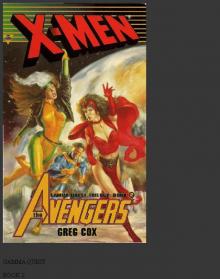 X-Men and the Avengers: Search and Rescue
X-Men and the Avengers: Search and Rescue Child of Two Worlds
Child of Two Worlds Welcome to Promise City
Welcome to Promise City The Librarians and the Mother Goose Chase
The Librarians and the Mother Goose Chase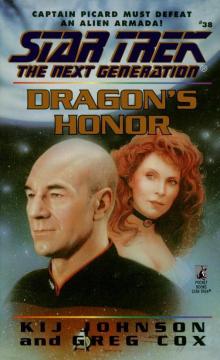 Dragon's Honor
Dragon's Honor 03 - Evolution
03 - Evolution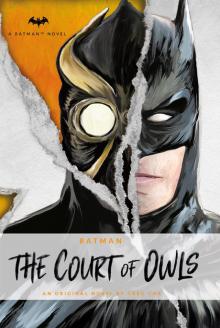 DC Comics novels--Batman
DC Comics novels--Batman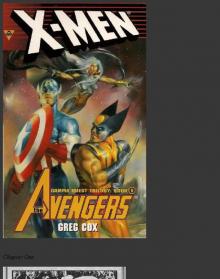 X-Men and the Avengers: Lost and Found
X-Men and the Avengers: Lost and Found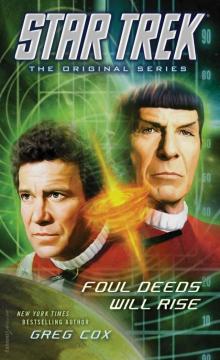 Foul Deeds Will Rise
Foul Deeds Will Rise 02 - Blood Enemy
02 - Blood Enemy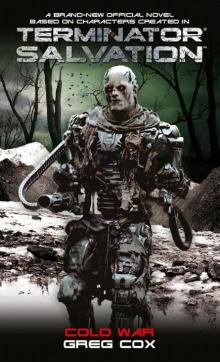 Terminator Salvation: Cold War
Terminator Salvation: Cold War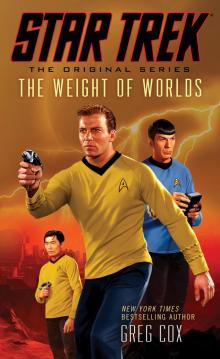 The Weight of Worlds
The Weight of Worlds The Antares Maelstrom
The Antares Maelstrom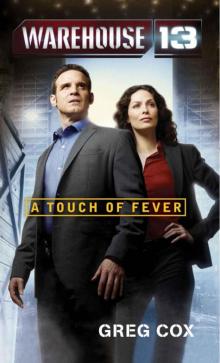 Warehouse 13: A Touch of Fever
Warehouse 13: A Touch of Fever Underworld: Blood Enemy
Underworld: Blood Enemy The Rise and Fall of Khan Noonien Singh
The Rise and Fall of Khan Noonien Singh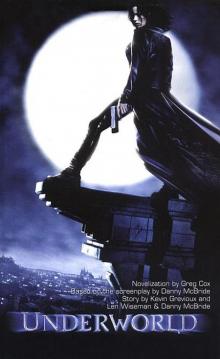 01 - Underworld
01 - Underworld The 4400- the Vesuvius Prophecy
The 4400- the Vesuvius Prophecy Assignment: Eternity
Assignment: Eternity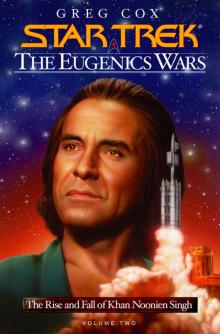 The Eugenics Wars, Vol. 2: The Rise and Fall of Khan Noonien Singh
The Eugenics Wars, Vol. 2: The Rise and Fall of Khan Noonien Singh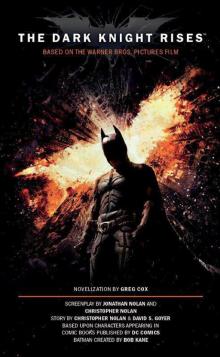 The Dark Knight Rises: The Official Novelization
The Dark Knight Rises: The Official Novelization The Bestseller Job
The Bestseller Job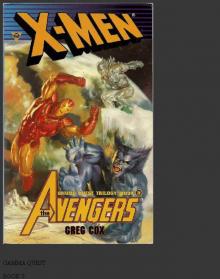 X-Men and the Avengers: Friend or Foe?
X-Men and the Avengers: Friend or Foe?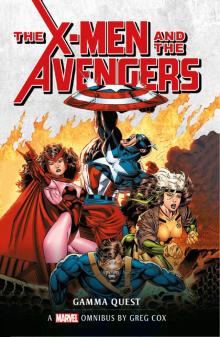 Marvel Classic Novels--X-Men and the Avengers
Marvel Classic Novels--X-Men and the Avengers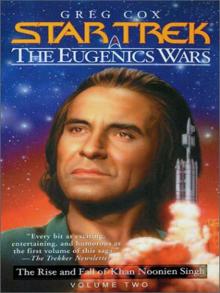 STAR TREK: TOS - The Eugenics Wars, Volume Two
STAR TREK: TOS - The Eugenics Wars, Volume Two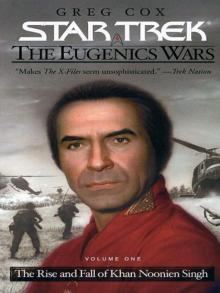 STAR TREK: TOS - The Eugenics Wars, Volume One
STAR TREK: TOS - The Eugenics Wars, Volume One The Black Shore
The Black Shore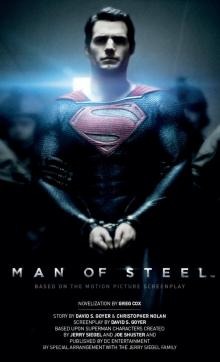 Man of Steel: The Official Movie Novelization
Man of Steel: The Official Movie Novelization Loose ends r-1
Loose ends r-1 Legacies
Legacies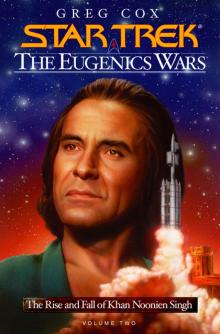 The Eugenics Wars, Volume Two
The Eugenics Wars, Volume Two Star Trek: The Original Series - 148 - The Weight of Worlds
Star Trek: The Original Series - 148 - The Weight of Worlds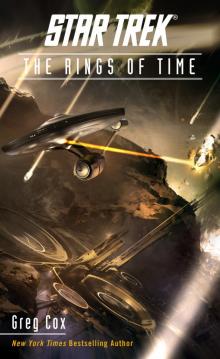 Star Trek: The Original Series: The Rings of Time
Star Trek: The Original Series: The Rings of Time Godzilla--The Official Movie Novelization
Godzilla--The Official Movie Novelization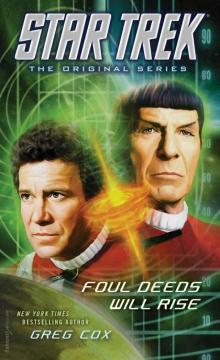 Star Trek: The Original Series - 160 - Foul Deeds Will Rise
Star Trek: The Original Series - 160 - Foul Deeds Will Rise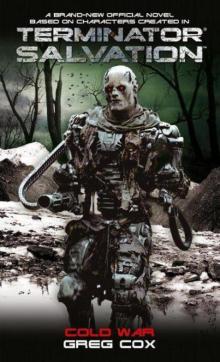 Terminator Salvation: Cold War ts-3
Terminator Salvation: Cold War ts-3 Star Trek: The Original Series: Miasma
Star Trek: The Original Series: Miasma Star Trek: The Original Series: No Time Like the Past
Star Trek: The Original Series: No Time Like the Past Child of Two Worlds (Star Trek: The Original Series)
Child of Two Worlds (Star Trek: The Original Series) THE 4400® WELCOME TO PROMISE CITY
THE 4400® WELCOME TO PROMISE CITY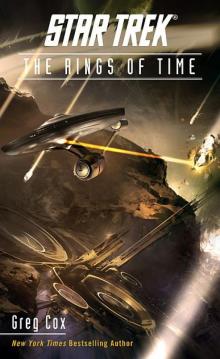 Star Trek: The Original Series: The Rings of Time (star trek: the original series)
Star Trek: The Original Series: The Rings of Time (star trek: the original series) To Reign in Hell: The Exile of Khan Noonien Singh
To Reign in Hell: The Exile of Khan Noonien Singh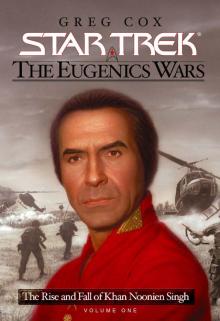 Star Trek: The Eugenics War, Vol. 1
Star Trek: The Eugenics War, Vol. 1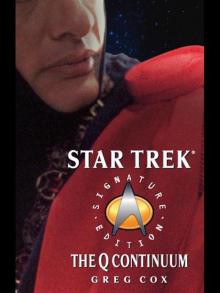 The Q Continuum
The Q Continuum